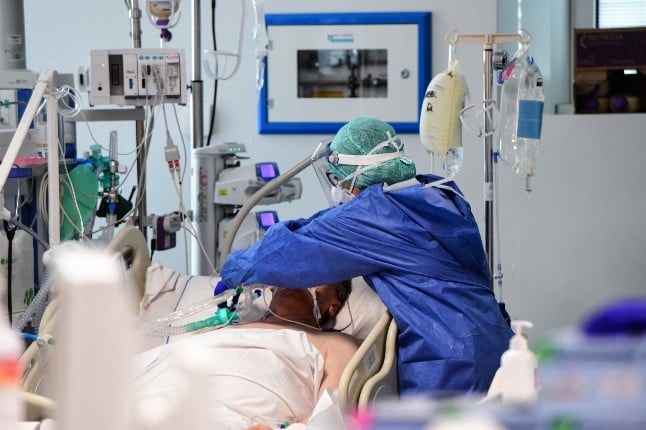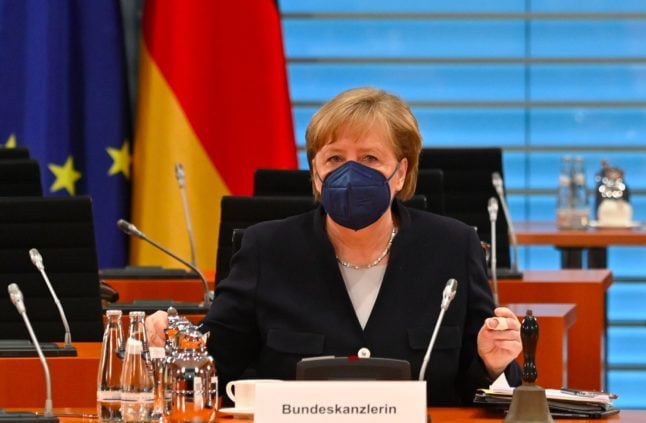WHO
Italy’s WHO whistle-blower: ‘I don’t want this swept under the carpet’
The World Health Organization (WHO) must safeguard its independence to retain credibility, claims an official who accuses the UN agency of censoring a report into Italy's response to the coronavirus pandemic.
Published: 9 January 2021 10:01 CET

Medics treat a patient at Brescia Poliambulanza hospital, Lombardy during the spring peak. Photo: Piero Cruciatti/AFP
Francesco Zambon, a WHO coordinator based in Venice, is currently embroiled in an internal dispute over his allegations that the agency pulled the study at the request of a top Italian official who risked being embarrassed by its contents.
The WHO and the official deny any wrongdoing, but Zambon says what he sees as the failure to properly address his concerns has wider consequences for the agency.
“Now that we are about to go on mission to China, we must be sure that the WHO is free of any external influence, otherwise its independence is at risk,” he said in a telephone interview with AFP.
WHO experts probing the origins of the Covid-19 pandemic were this week denied entry to China, which has appeared reluctant to allow an independent investigation.
The UN agency previously faced strong criticism, led by the United States, for seemingly being too soft on China and its lack of transparency on the outbreak of the novel coronavirus.
“I believe that the world needs a WHO free of conflicts of interests, not just concerning the partners it works with… but starting with its own staff,” Zambon said.
World looking at Italy
The Italian, 47, has worked at the WHO since 2008, first in Moscow and most recently as coordinator at the body's European Office for Investment for Health and Development in Venice.
He coordinated work on a 102-page document analysing Italy's coronavirus response, after it became the first country outside China to face a major wave of infections.
The document was withdrawn a day after its release on May 13 — a decision that Zambon claims was to avoid embarrassing Ranieri Guerra, a senior WHO official who was previously a key player in Italy's pandemic planning.
Guerra, director general for preventive health at the Italian health ministry during 2014-17 and now a WHO assistant director general, denies any wrongdoing.
WHO Europe meanwhile said last month that the Italy report was pulled because it contained “factual inaccuracies”.
“There were no political considerations, I can reassure you,” the WHO's regional director for Europe, Hans Kluge, told reporters this week.
Zambon said there was an error in the report, but it was quickly fixed — and argued that publication would have helped other countries dealing with coronavirus.
“The entire world was looking at Italy,” he said.
Nevertheless, the document was released when most of Europe was already deep into the pandemic, and contained mostly familiar advice and recommendations.
The WHO said the report was never republished because by then the agency had found new ways for countries to share experiences of the pandemic.
Last month it made the document available to journalists to counter accusations of a cover-up.
The report said Italy's pandemic preparedness plan had not been updated since 2006, and the initial reaction of its hospitals was “improvised, chaotic and creative”.
Bergamo legal action
The controversy has caught the attention of prosecutors in Bergamo, the northern city that was the epicentre of Italy's initial coronavirus outbreak.
Both Guerra and Zambon have been questioned as part of an investigation into what went wrong in the early stages of a pandemic that has so far killed more than 77,000 people in Italy.
“I have great confidence in Italian justice,” Zambon told AFP. He believes his revelations have now caused him to be sidelined at the WHO, but claims his complaints have gone nowhere.
“I can no longer work in Europe because I've been isolated — the typical fate of the whistleblower,” he said.
WHO Europe has refused to comment on any issues surrounding individual staff members.
Zambon added: “The risks for me are quite irrelevant, what I don't want is all this to be swept under the carpet.
“It is a question of conflicts of interest and internal compliance mechanisms.”
Url copied to clipboard!


 Please whitelist us to continue reading.
Please whitelist us to continue reading.
Member comments